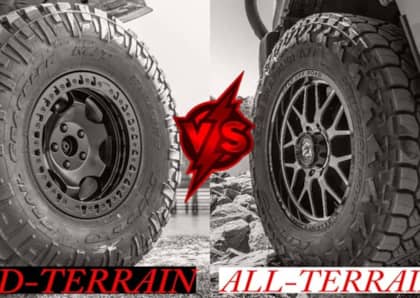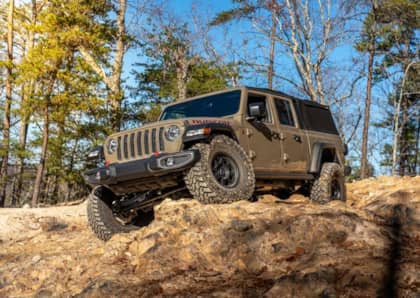The Dana 44 Story: How This Ultra-Tough Axle Became An Off-Road Legend
Your off-road rig is only as strong as its weakest link, and for many vehicles this turns out to be the axles. Charged with funneling engine torque to the ground, the axle housing and the axles attached to it take more abuse on the trail than almost any other driveline component, not only from the internal stress of power over obstacles and through deep mud and water, but also from coming into contact with whatever your truck or SUV can't quite clear.

For more than 70 years the Dana 44 axle has been the go-to choice for brands seeking a tough off-the-shelf setup for their 4x4s and enthusiasts looking to upgrade to the industry's gold standard for enduring abuse. Perhaps the greatest example of 'if it ain't broke, don't fix it' in the modern automotive world, the Dana 44 has dominated over the decades by reminding us that once upon a time, versatility and over-engineering were the order of the day if you wanted to make it in the car business.
Dana, Dana, Everywhere
Dana Incorporated first opened its doors in 1904, initially doing business under the name of 'Spicer' as it carved out its niche in the world of universal joint manufacturing. By the time it was renamed Dana, it had branched out into a variety of driveline directions, eventually hooking up with Willys during World War II to contribute axles (the Dana 25 and the Dana 23-2) to the MA/MB line of go-anywhere runabouts that would eventually be sold to civilians as the Jeep.

Dana continued to evolve its axle designs, with the first Dana 44 examples appearing in the early 1950s. Ford picked up on the Dana 44's strengths first, installing them under the first-generation Ford Thunderbird in 1955 and then a few years later making them available in its light-duty pickups, and eventually Carroll Shelby's AC Cobra.

From there, the spread was rapid. Jeep started using the Dana 44 with many different models in the 1960s, a practice that continues today, and vehicles like the Chevrolet and Dodge pickup lines and the International Scout also gained Dana 44 axles during that same decade. This was followed closely by the Chevrolet Blazer, Dodge Ramcharger, and Ford Bronco.

Dana kept developing axles, including the tougher Dana 60, but the 44 persisted thanks to its relatively lightweight design that made it easier to engineer into passenger car, pickup, and SUV platforms. By the 1990s, even Isuzu had gotten into the act, providing its capable Rodeo SUV (and the two-door version, the Amigo) with Dana 44s, followed by the Mitsubishi Montero and the Nissan Titan. The Chevrolet Corvette, the Pontiac GTO, a long list of Jaguars, and even the Dodge Viper have all used the independent rear suspension variant of the Dana 44, too.
Versatile, Tough, Affordable
What makes the Dana 44 so popular? In a word, the axle has a well-earned reputation for being near-indestructible in all but the most hardcore applications.

The original Dana 44 was known for its range of manufacture in order to meet the specific needs of one automaker or another. This means that there are versions that feature offset (to either side) as well as centered differentials, in addition to pinions that located above and below the centerline of the axle and of course the solid axle and independent front and rear axle designs mentioned earlier.

Still, there are many details about the Dana 44 that are common across the board. The case features a 9 and 3/8s inch diameter and comes with a 10-bolt ring gear that measures 8.5 inches at the rear. Both front and rear axle shafts feature 30 splines, with an axle shaft thickness of 1.31 inches, and axle tube diameters start at 2.5 inches on the low side and top out at 3 inches. You'll find five, six, and eight-lug versions of the axle.

There are a bewildering array of gear sets available for the Dana 44, ranging from 2.72:1 all the way up to 5.89:1, which has helped it become a legend among off-roaders. A pair of carrier sizes splits these offerings nearly in the middle, with the demarcation line at the 3.91:1 ratio. Casting numbers on the front of the differential case (rear) or right side (front) are helpful when determining which particular flavor of Dana 44 you're looking at, especially if you need to order replacement parts.

A modernized version appeared with the JK Wrangler in 2007 (the 'next generation' Dana 44) that featured a number of differences versus the original. Specifically, this high pinion design offered an 8.8 inch rear gear diameter (while maintaining an 8.5 inch front rear gear), slightly larger carrier bearings, a tighter range of ratios given that it was offered on the Rubicon trim, (4.88:1, 5.13:1, and 5.38:1), and a 4 spider gear case.
Still A Solid Choice
Today, there's no shortage of Dana 44 axles available from either your local wrecking yard, the various parts counters of the more than a dozen brands that made use of the technology, and of course aftermarket companies like Dynatrac that manufacture brand new versions of the design.

With almost no limits in terms of gear set, where the axle can be placed, or even the design of the unit itself, the Dana 44 lends itself well to rock crawlers, drag racers, street cars, and conversions from weaker stock components to beefy setups that can handle much more power than what the factory dished out.











